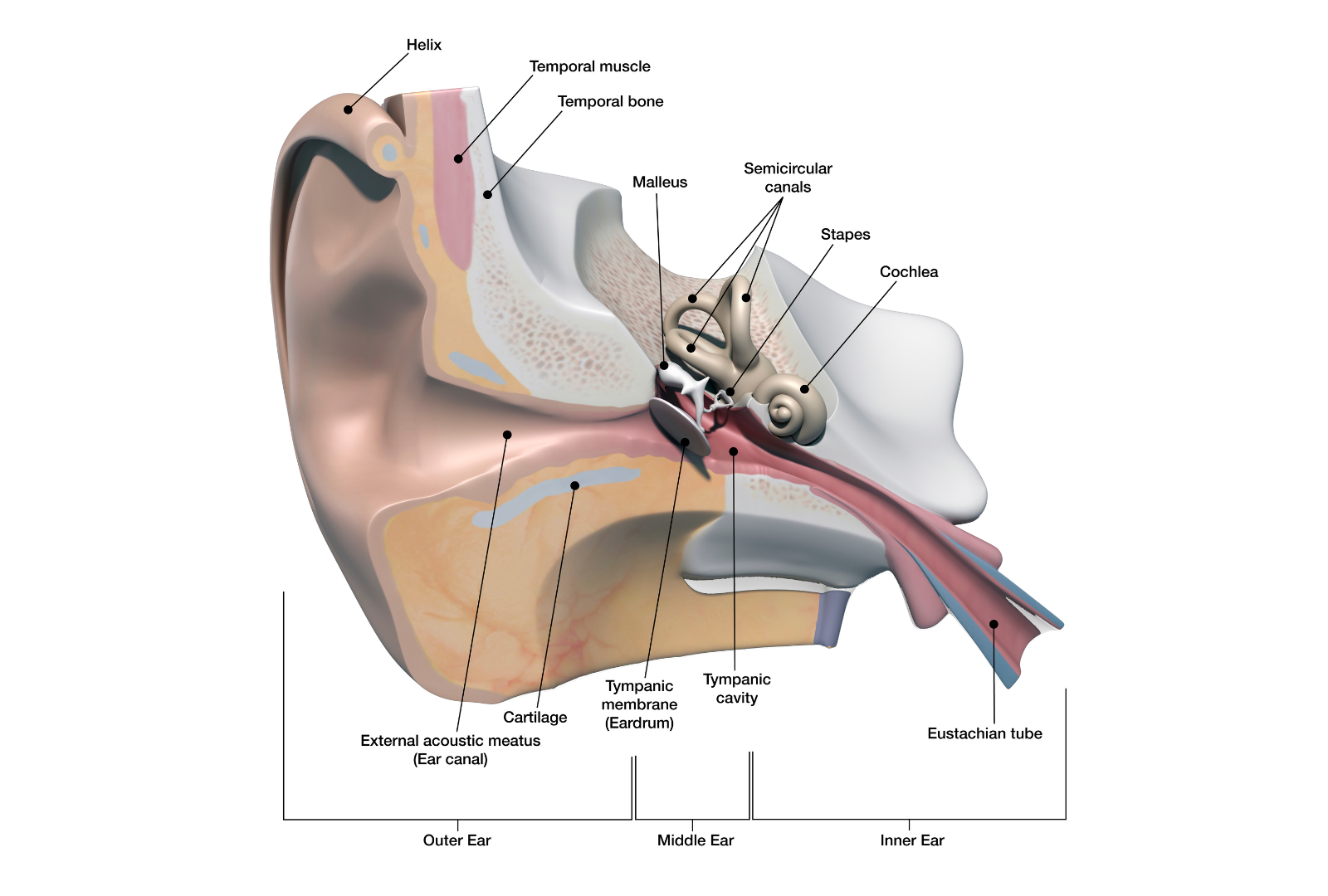Temporomandibular joint (TMJ) disorders are a group of conditions that affect the jaw joint and surrounding muscles. While TMJ disorders are commonly associated with jaw pain and difficulty in chewing, many people are unaware of the potential impact they can have on hearing. Understanding the connection between TMJ disorders and hearing loss is crucial for proper diagnosis and treatment of both conditions.
In this article, we will delve into the mechanisms behind TMJ-related hearing loss, explore the symptoms and diagnosis, discuss treatment options, and provide tips for prevention.
TMJ-Related Hearing Loss: Symptoms and Diagnosis
Identifying TMJ-related hearing loss can be challenging, as the symptoms may overlap with other conditions. Individuals experiencing TMJ-related hearing loss may report a combination of the following symptoms:
- Ear fullness or pressure
- Tinnitus (ringing or buzzing in the ears)
- Reduced hearing sensitivity
- Ear pain or discomfort
- Muffled or distorted hearing
- Dizziness or imbalance
If you suspect TMJ-related hearing loss, it is crucial to seek professional medical evaluation.
How TMJ can affect your hearing
The temporomandibular joint (TMJ) is a crucial joint located in front of the ears, connecting the jawbone to the skull. TMJ disorders encompass various conditions that affect this joint and the surrounding muscles.
While the primary symptoms of TMJ disorders are related to the jaw, such as pain, clicking, and limited movement, emerging research suggests that these disorders can also have an impact on hearing. Some of the crucial links between temporomandibular joint (TMJ) disorders and hearing loss may include;
Proximity and Potential Mechanisms
One possible explanation for the association between TMJ disorders and hearing loss is the close proximity of the temporomandibular joint to the middle ear. The middle ear contains the ossicles, which transmit sound vibrations from the eardrum to the inner ear. The thin bony wall separating the temporomandibular joint and the middle ear, known as the tympanic plate, leaves room for potential influences on middle ear function and hearing.
Shared Neural Pathways and Muscle Dysfunction
Another theory proposes that the muscles involved in TMJ disorders, including those responsible for jaw movement and those connected to the middle ear, may share neural pathways or have interconnected reflexes. Dysfunction in these muscles could disrupt the normal functioning of the auditory system, leading to hearing-related symptoms.
Role of Chronic Pain and Stress
TMJ disorders are often associated with chronic pain conditions and increased levels of stress. Chronic pain and stress have been shown to influence the auditory system, affecting hearing thresholds and auditory processing. Shared neurophysiological mechanisms between pain, stress, and hearing may contribute to the observed association between TMJ disorders and hearing loss.
Overall, while TMJ disorders primarily present with jaw-related symptoms, research indicates a potential link to hearing loss. Further investigations are necessary to fully comprehend the underlying mechanisms and establish a definitive causal relationship.
The Role of Inflammation and Nerve Compression in TMJ-Related Hearing Loss
Inflammation and nerve compression are significant factors in understanding the relationship between TMJ disorders and hearing loss. These mechanisms shed light on how TMJ-related inflammation and jaw misalignment can impact the auditory system and give rise to various hearing-related symptoms.
Inflammation and Swelling
One theory focuses on the inflammation and swelling commonly associated with TMJ disorders. Inflammation in the temporomandibular joint and surrounding tissues can spread to nearby structures, including the middle ear. This inflammation may disrupt the delicate structures of the middle ear, such as the ossicles or the eardrum, and interfere with their ability to transmit sound vibrations effectively, leading to a variety of symptoms such as ear fullness, pressure, and potential hearing loss. The inflammation-induced disruption can impede the movement of air and fluid in the Eustachian tube – the tube that connects the middle ear to the back of the throat, leading to changes in middle ear pressure and impaired sound transmission to the inner ear.
Nerve Compression
The misalignment or dysfunction of the jaw joint in TMJ disorders can result in nerve compression. The nerves that supply the ear, including the trigeminal nerve and its branches, pass through or near the temporomandibular joint.
When the jaw joint is misaligned, excessive pressure or tension can be exerted on these nerves, affecting their normal function. The compression of these nerves can disrupt the transmission of auditory signals from the ear to the brain, resulting in various hearing-related symptoms. Tinnitus, a ringing or buzzing sensation in the ears, reduced hearing sensitivity, and a feeling of blocked or muffled hearing are among the potential auditory symptoms that may arise from nerve compression.
It is important to note that the relationship between TMJ-related inflammation, nerve compression, and hearing loss is complex and multifaceted. Further research is needed to gain a more comprehensive understanding of the underlying mechanisms and the extent of their impact on auditory function. Additionally, individual variations in the presentation of TMJ disorders and associated hearing symptoms should be considered, as the severity and specific mechanisms can vary from person to person.
Treatment Options for TMJ-Related Hearing Loss
When addressing TMJ-related hearing loss, a comprehensive and multidisciplinary approach is typically employed to manage both the temporomandibular joint (TMJ) disorder and the associated auditory symptoms. The treatment options for TMJ-related hearing loss focus on relieving TMJ-related symptoms, promoting jaw joint stability, and addressing any potential hearing difficulties.
At Singapore Paincare, our team of experienced primary care and pain care specialists together with a dental specialist can conduct a comprehensive evaluation to determine the underlying cause of the symptoms.
Conservative Measures
Oral Appliances
Dental splints, also known as bite plates, are frequently used in the treatment of temporomandibular joint disorders (TMDs). These transparent plastic devices are designed to fit between the upper and lower teeth, aiming to alleviate the issues of grinding and clenching. Splints are typically used for a limited duration to prevent lasting modifications to the teeth or jaw. Despite their widespread prescription and utilisation, the long-term effectiveness of this intervention remains uncertain.
Pain Management
Non-steroidal anti-inflammatory drugs (NSAIDs): Non-steroidal anti-inflammatory drugs (NSAIDs) or muscle relaxants may be prescribed to alleviate pain and reduce inflammation in the TMJ area. This can potentially alleviate symptoms impacting the auditory system.
Platelet Rich Plasma (PRP) injections: PRP injections can be administered into the temporomandibular joint and its surrounding muscles. PRP injections have been found effective in reducing pain, joint sounds, and improving mandibular motion in temporomandibular disorder management. These injections aid in healing and recovery of fatigued and overstrained muscles and joints, potentially improving the associated hearing loss.
Botulinum Toxin Injections: Botulinum Toxin injections can be administered into the masseter muscles, responsible for chewing and jaw movement. By temporarily immobilizing the muscles causing TMJ disorder symptoms, Botulinum Toxin provides relief from jaw tension, pain, and associated hearing loss. It can also alleviate headaches and prevent involuntary movements like teeth grinding and clenching.
“Botulinum Toxin can be injected into the muscles surrounding the TMJ, including the masseter muscle. A lot of people think mouth guards help, but these only protect against your teeth. Botulinum Toxin injection works directly to relieve that jaw tension and pain. It can eliminate headaches, teeth grinding, and lockjaw by relaxing the muscle that unconsciously creates such stress.” – Dr Bernard Lee, Chief Consultant Pain Specialist of Singapore Paincare Center
Physical Therapy
Specific exercises and stretches prescribed by a physical therapist can help strengthen the jaw muscles, improve jaw mobility, and alleviate muscle tension that may contribute to TMJ-related hearing issues.
Dental Interventions
Occlusal Adjustments
Dentists may perform occlusal adjustments by selectively reshaping the biting surfaces of the teeth to achieve a more harmonious and balanced bite. This can help improve jaw alignment and alleviate TMJ-related symptoms, potentially including those affecting hearing.
Orthodontic Treatment
In cases where misalignment of the teeth or jaw contributes to TMJ disorders and associated hearing issues, orthodontic treatment, such as braces or clear aligners, may be recommended to correct the alignment and improve overall jaw function.
Surgical Interventions
In rare and severe cases where conservative measures have not provided sufficient relief, surgical intervention may be considered. Surgical options may include arthrocentesis (flushing out the TMJ with fluid), arthroscopy (minimally invasive procedures to address TMJ disorders), or open joint surgery (involving more extensive correction of the joint structure).
The goal of surgery is to alleviate TMJ-related symptoms, including those affecting hearing, by improving joint function and stability.
In cases of severe TMJ pain, surgical interventions may be suggested. However, it is important to carefully consider the potential risks and irreversible nature of these treatments. Jaw or TMJ surgery, as well as reshaping or shaving down the teeth, can potentially damage the TM joint. Most individuals with TMJ disorders do not require surgery, and alternative options should be explored.
Preventing TMJ-Related Hearing Loss: Tips and Recommendations
While some TMJ-related hearing loss cases are unavoidable, there are steps individuals can take to minimize the risk. Here are some tips and recommendations:
- Maintain good oral hygiene: Proper dental care, including regular brushing, flossing, and dental check-ups, can help prevent oral health problems that may contribute to TMJ disorders.
- Practice stress management techniques: Stress and anxiety can exacerbate TMJ symptoms. Engaging in stress reduction techniques, such as relaxation exercises, meditation, and regular physical activity, may help prevent or alleviate TMJ-related issues.
- Avoid excessive jaw movements: Habits like teeth grinding, clenching, and nail-biting can strain the jaw joint and contribute to TMJ disorders. Awareness and conscious efforts to avoid these habits can be beneficial.
- Use protective nightguards: Nightguards, custom-made oral appliances, can help protect the teeth and alleviate jaw tension during sleep. They can be especially useful for individuals who grind or clench their teeth.
- Seek professional help: If you experience persistent jaw pain, clicking sounds, or any hearing difficulties, consult a dentist or an ENT specialist with expertise in TMJ disorders. Early diagnosis and appropriate treatment can help prevent the progression of TMJ-related hearing loss.
Understanding the connection between TMJ disorders and hearing loss is crucial for early detection and effective management. If you or someone you know is experiencing symptoms of TMJ-related hearing loss, seeking help from a Pain Doctor to explore appropriate treatment options can improve your quality of life and prevent further hearing complications.







